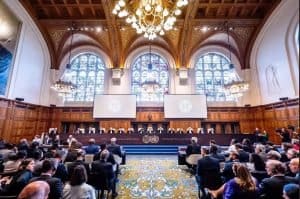UN experts want climate change action grounded in human rights principles. PHOTO/UN.. By PATRICK MAYOYO. newshub@eyewitness.africa. At the UN Climate Conference (COP30) in Belem, Brazil, a group of UN experts has called on states to take urgent and effective action to address climate change, grounded in human rights principles.. In a joint statement, the experts urged countries to follow the guidance set out by the International Court of Justice (ICJ) Advisory Opinion, which outlines the obligations of states to prevent further harm to the environment, climate, and human rights.. The experts emphasised that COP30 negotiators must negotiate in good faith and work towards the swift implementation of international climate agreements, including the UN Framework Convention on Climate Change (UNFCCC) and the Paris Agreement, while adhering to their duties under international human rights law.. According to the statement, the ICJ’s advisory opinion, along with findings from other international bodies such as the International Tribunal for the International Tribunal of the Law of the Sea and theInter-American Court of Human Rights, has reinforced the strict obligations of states to safeguard the climate and the environment. This includes actions to mitigate and adapt to climate impacts, as well as to conserve and restore ecosystems.. “The ICJ Advisory Opinion makes it clear that all states must take stringent measures to protect the climate system and prevent harm through mitigation, adaptation, and ecosystem restoration,” the experts said. “This integrated approach is essential to prevent disproportionate harm to vulnerable communities and ensure that no one is left behind as the climate crisis escalates.”. The International Court of Justice’s advisory opinion on climate change, issued July 23, offers a chance to create a unified understanding of states’ climate obligations, transcending specific treaties and regional arrangements and cutting across the entire spectrum of international law. It provides authoritative guidance on how international law applies more broadly to the climate crises.. Initiated by the Pacific Island nation of Vanuatu, the United Nations General Assembly (UNGA) Resolution A/77/L.58 – jointly sponsored by 132 developed and developing countries – formally requested an advisory opinion from the International Court of Justice (ICJ) concerning states’ legal duties on climate change.. It was the culmination of a six-year campaign initiated by the Pacific Island Students Fighting Climate Change (PISFCC), who, when faced with the existential threat of sea level rise, sought legal clarity on climate obligations through the world’s highest court.. The advisory opinion was hailed as a historic turning point in climate justice and accountability, with the ICJ unanimously affirming the entirety of Vanuatu’s submissions.. The ICJ recognized the interdependence between human rights and the protection of the environment. It affirmed that every person has a human right to a “clean, healthy and sustainable” environment, which is a prerequisite for enjoying foundational rights – such as life, health, food, water and housing.. It said states cannot meet their existing human-rights obligations unless they also protect the environment. The court treats the right as firmly grounded in international, regional and national law, pointing to its widespread recognition by United Nations resolutions, human-rights treaties and more than 100 constitutions.. The experts also warned that the credibility of COP30 is at stake, stressing the need for meaningful outcomes on emissions reduction, international cooperation, and financial support, particularly in relation to fossil fuels and their links to human rights violations, including impacts on health, economic inequality, and education.. The ICJ advisory offers a chance to create a unified understanding of states’ climate obligations. PHOTO/UN.. Further, the group called for the adoption of a Just Transition Work Programme, which would ensure that climate action, particularly a shift to renewable energy economies, is fair, inclusive, and co-developed with workers and affected communities.. This, they said, is vital for fulfilling the ICJ’s conclusion that the right to a healthy environment is a “precondition” for the enjoyment of all other human rights.. The statement also called for a reduction in the influence of fossil fuel lobbyists at COP30, urging greater transparency, civil society participation, and stronger protection for environmental human rights defenders.. The UN experts who issued the statement included a wide range of specialists, from those focused on climate change, indigenous rights, and the rights of vulnerable groups, to experts on economic and cultural rights. They serve as independent human rights experts appointed by the UN Human Rights Council and work on a voluntary basis.. As COP30 continues, all eyes are now on whether negotiators can rise to the challenge and create a just, rights-based approach to tackling the climate crisis.. Read the UN Experts full statement here.
